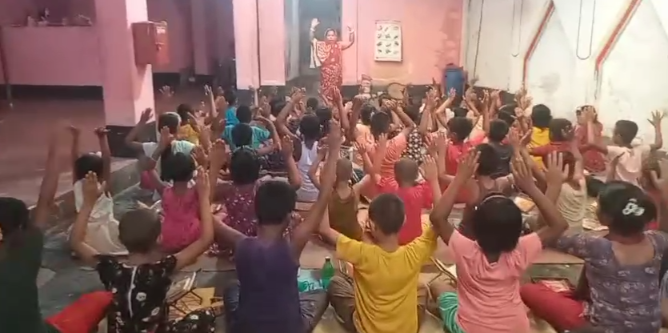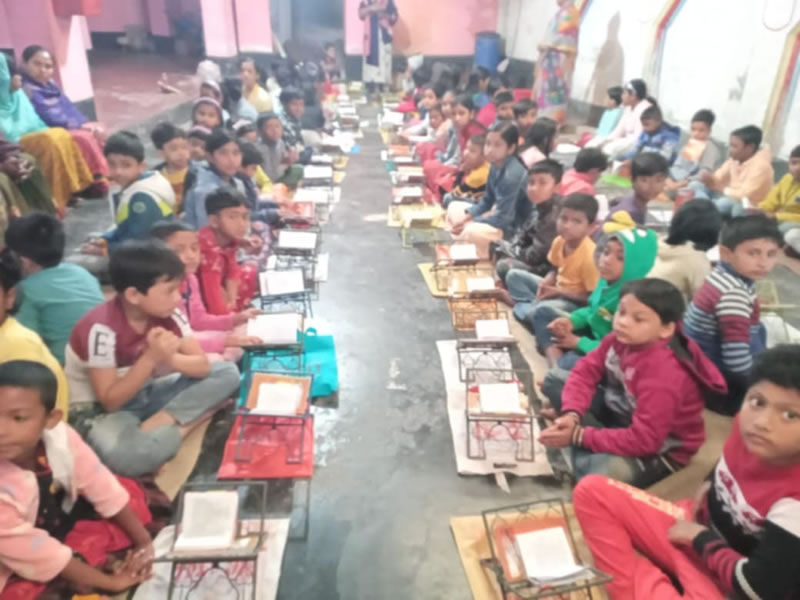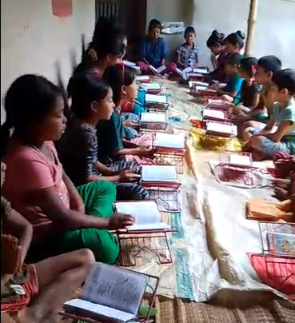Gita Principles in Bangladesh: Apply Krishna's Teachings to Daily Life
- Jeffrey Dunan
- Sep 29, 2025
- 11 min read
Key Takeaways
The Bhagavad Gita offers timeless principles that directly address modern Bangladeshi challenges, including work-life balance, family harmony, and personal fulfillment
Practicing karma yoga (selfless action) helps Bangladeshis navigate professional environments while maintaining spiritual integrity
Understanding your dharma (purpose) brings clarity to daily decisions and reduces anxiety in Bangladesh's fast-developing economy
Morning meditation and Gita recitation provide mental resilience against the stresses of urban Bangladeshi life
Lotus Ministry Trust provides resources and community support for those seeking to integrate Krishna consciousness into their daily lives
In Bangladesh's rapidly evolving landscape, many find themselves caught between traditional values and modern pressures. The ancient wisdom of the Bhagavad Gita offers profound solutions to these contemporary challenges. Far from being merely philosophical, Krishna's teachings provide practical guidance for navigating daily life with purpose, peace, and spiritual fulfillment.
The spiritual principles of the Gita are increasingly relevant in Bangladesh, where economic development often conflicts with spiritual tradition. As more Bangladeshis experience the emptiness of pure materialism, they're turning to Krishna's timeless wisdom for balance. The beauty of these teachings lies in their applicability—they don't require abandoning your responsibilities but rather transform how you approach them.
How Krishna's Wisdom Solves Today's Bangladeshi Struggles
The challenges facing modern Bangladesh—rapid urbanization, economic pressure, family stress, and spiritual disconnection—mirror the very battlefield where Krishna counseled Arjuna. Just as Arjuna faced impossible choices and overwhelming anxiety, today's Bangladeshis navigate complex moral and practical dilemmas that require both wisdom and courage.
Finding Peace Amid Urban Chaos
Dhaka's congested streets, constant noise, and frenetic pace leave little room for spiritual reflection. Yet the Gita teaches that true peace comes not from external circumstances but from inner stillness. When you practice the Gita principle of equanimity (sthita-prajna), you develop the ability to maintain calm awareness regardless of external chaos. Thousands of Bangladeshis are discovering that even a 15-minute morning practice of Gita-based meditation transforms their experience of urban life.
One Dhaka professional shared: "Before incorporating the Gita's teachings, traffic jams were my daily nightmare. Now I use that time for mantra meditation, turning frustration into spiritual opportunity. My blood pressure has normalized, and colleagues ask what's changed in my life."
Overcoming Materialism in a Developing Economy
Bangladesh's growing economy creates unprecedented opportunities alongside increasing materialism. The Gita's teaching about non-attachment to results (karma-phala-tyaga) provides a revolutionary perspective on success. Rather than rejecting professional ambition, Krishna consciousness teaches you to pursue excellence while remaining unattached to outcomes.
This principle transforms the workplace experience. When your sense of worth isn't tied exclusively to results, you work with greater creativity, ethics, and purpose. Many Bangladeshi entrepreneurs practicing Gita principles report that their businesses actually thrive when they focus on contribution rather than extraction. They make decisions that benefit all stakeholders, not just short-term profits.
Building Stronger Family Relationships Through Spiritual Values
Bangladesh's family structures face unprecedented pressures from modernization, migration, and changing social norms. The Gita's emphasis on duty (dharma) and selfless love provides a foundation for healthy relationships in changing times. When family members understand their responsibilities as spiritual opportunities rather than burdens, conflicts diminish and deeper connections emerge. For more insights, explore the five topics of Bhagavad Gita that can help strengthen these values.
Families practicing Krishna consciousness together report stronger bonds across generations. Shared spiritual values create common ground between tradition-minded elders and forward-looking youth. The Gita's teaching that all beings contain the same divine spark (atman) helps family members see beyond personality differences to honor each other's essential nature.
"When our family began studying the Bhagavad Gita together on Sunday evenings, something remarkable happened. The generational conflicts that had been tearing us apart gradually dissolved. My parents became more accepting of modern realities, while my children gained appreciation for traditional wisdom. Krishna's teachings provided a bridge across our differences." - Rahman family, Chittagong

Students Eager To Learn Core Gita Principles
5 Core Gita Principles That Transform Bangladeshi Daily Life
1. Karma Yoga: Action Without Attachment
Karma yoga transforms how Bangladeshis approach work, family obligations, and daily tasks. This principle teaches that what matters is not what you do but how you do it. When you perform actions as an offering to Krishna rather than for personal gain, every task becomes sacred. This shifts work from drudgery to devotion.
2. Duty First: Understanding Your Dharma
In Bangladesh's complex social fabric, understanding your unique dharma brings clarity and purpose. Dharma extends beyond religious obligation to encompass your authentic role in society based on your nature and abilities. Many Bangladeshis struggle with competing expectations from family, profession, and society. The Gita teaches that true fulfillment comes from identifying your essential nature (swadharma) and performing it excellently without envy of others' paths.
A Chittagong university professor shared how this principle transformed her career: "For years I pursued an administrative path because it offered more prestige, though teaching was my passion. After studying the Gita, I embraced my natural dharma as an educator. The peace this brought me actually opened more meaningful opportunities than I had when striving for status."
3. Controlling the Mind Through Meditation
The untamed mind creates unnecessary suffering through worry, regret, and endless desires. In Bangladesh's increasingly fast-paced environment, mental agitation has become a common health concern. The Gita offers practical techniques for mastering the mind rather than being controlled by it. Chapter 6 of the Bhagavad Gita provides detailed meditation instructions that even busy Bangladeshis can implement in daily life.
Regular practitioners report improved focus, emotional regulation, and decision-making. The technique is simple yet profound: focus your attention on Krishna while dispassionately observing thoughts without attachment. This practice, even for just 15 minutes daily, gradually trains the mind to become your servant rather than your master.
One Dhaka IT professional noted: "In our high-pressure industry, burnout is common. Since establishing a consistent meditation practice based on the Gita's techniques, I've maintained clarity and creativity even during project crises. My team now starts our workday with a brief meditation session, and our productivity has actually increased while stress has decreased."
4. Practicing Detachment While Fulfilling Responsibilities
Many Bangladeshis misunderstand detachment (vairagya) as abandoning responsibilities or becoming emotionally cold. The Gita clarifies that true detachment means performing your duties wholeheartedly while releasing attachment to outcomes. This paradoxical approach allows for full engagement without the anxiety of results-fixation.
A Sylhet agricultural entrepreneur explained: "When crop diseases threatened my farm, I was initially paralyzed with worry about potential financial ruin. Through studying the Gita, I learned to take all necessary actions while surrendering the results to Krishna. This mental shift allowed me to implement innovative solutions with a clear mind rather than panic-driven decisions. We salvaged most of the harvest, but more importantly, I maintained my spiritual equilibrium through the crisis."
5. Bhakti: Devotional Service in Modern Context
At the heart of the Gita's teachings is bhakti—devotional service to Krishna. In Bangladesh's contemporary setting, bhakti can be practiced through traditional means like temple worship and also through the sanctification of daily activities. When performed with devotion and offered to Krishna, cooking, cleaning, professional work, and family care all become spiritual practices.
This inclusive approach makes Krishna consciousness accessible to all Bangladeshis regardless of life circumstances. A Rajshahi homemaker described her realization: "I used to think spiritual life was only for those who could spend hours in formal worship. The Gita showed me that my kitchen could be my temple and my cooking an offering of love. This transformed my household duties from mundane chores to spiritual practice, bringing joy to tasks I previously resented."
Morning Practices That Bring Gita Wisdom to Your Day
Establishing a morning spiritual routine creates a foundation for applying Gita principles throughout your day. In Bangladesh's busy households, even a brief morning practice can transform your entire approach to daily challenges. The most successful practitioners rise before sunrise (brahma-muhurta) when the environment is naturally conducive to spiritual clarity.
Your morning ritual needn't be elaborate—consistency matters more than duration. Even 30 minutes dedicated to spiritual practice can anchor your consciousness in Krishna's wisdom throughout the day's activities. Many Bangladeshi Krishna devotees find that this investment of time actually makes their day more productive and harmonious.
Simple 15-Minute Meditation Technique
Begin with a simplified meditation practice drawn directly from the Gita's instructions. Find a clean, quiet space in your home, preferably before others awake. Sit with spine erect but comfortable, either on the floor with a cushion or in a chair with feet flat on the ground. Close your eyes and bring attention to your natural breath for several cycles. Then begin silently repeating the maha-mantra: Hare Krishna, Hare Krishna, Krishna Krishna, Hare Hare / Hare Rama, Hare Rama, Rama Rama, Hare Hare. When the mind wanders—which it naturally will—gently return to the mantra without self-criticism.
This practice calms the mental fluctuations that the Gita identifies as the source of suffering. Even skeptical first-time practitioners in Bangladesh report experiencing surprising peace and clarity. With consistent practice, this meditation becomes progressively deeper and more transformative. Many find that early challenges with concentration gradually resolve as the mind becomes trained through regular practice.
Gita Verses to Recite for Mental Strength
Memorizing key Gita verses provides powerful mental resources for navigating daily challenges. Many Bangladeshi practitioners begin with chapter 2, verse 14: "O son of Kunti, the nonpermanent appearance of happiness and distress, and their disappearance in due course, are like the appearance and disappearance of winter and summer seasons. They arise from sense perception, O scion of Bharata, and one must learn to tolerate them without being disturbed." This verse alone has helped countless individuals maintain equanimity during Bangladesh's frequent natural disasters, political uncertainties, and personal setbacks.
Village Community Transformed Through Collective Study
In rural Mymensingh, a remarkable transformation occurred when a small group of farmers began weekly Bhagavad Gita discussions under a banyan tree. What started with five curious villagers has grown to over fifty regular participants spanning three generations. Their community once faced frequent disputes over land, water access, and family matters that often escalated to involvement with local authorities.
"Before our Gita circle began, neighbors barely spoke except to argue. Now we approach problems as spiritual challenges to overcome together. When drought threatened our crops last season, instead of competing for water resources, we created a sharing system based on Krishna's teachings about community harmony." - Sunil Das, village elder
The economic impact has been equally significant. By applying Gita principles of non-attachment and cooperative action, the villagers established a collective approach to market negotiations. Their collaborative method increased everyone's income while reducing individual stress. More importantly, domestic violence reports have decreased by nearly 70% according to local authorities, who attribute the change to the spiritual values now permeating family life.
Similar community transformations are occurring throughout Bangladesh as people discover that the Gita's wisdom isn't meant to be practiced in isolation but flourishes in community application. These modern-day examples echo how Krishna consciousness historically created harmonious societies based on spiritual principles rather than mere economic or political structures.
Overcoming Obstacles in Your Spiritual Journey
The path of Krishna consciousness inevitably includes challenges. The Gita itself arose from Arjuna's moment of crisis and confusion. Contemporary Bangladeshi practitioners face their own forms of resistance, both internal and external. Understanding these common obstacles and having strategies to overcome them is essential for sustained spiritual growth in today's complex social environment.
When Family Opposes Your Spiritual Practice
Many new practitioners in Bangladesh face resistance from family members concerned about deviating from established religious or cultural norms. Rather than creating confrontation, the Gita teaches respecting others while steadily following your spiritual path. Begin by demonstrating how your practice enhances rather than diminishes your family commitments. Show through actions how Krishna consciousness makes you more patient, loving, and responsible.
Keep your practice simple and unobtrusive initially. A small altar in your personal space, silent mantra meditation, or reading Gita passages privately won't disrupt household harmony. Share the philosophical aspects of Gita wisdom rather than religious elements with skeptical family members. Many find that focusing on universal principles like mindfulness, ethical living, and stress reduction creates openness where emphasizing theological distinctions might create barriers.
A Khulna schoolteacher shared her experience: "My husband was initially suspicious when I began reading the Gita, fearing I was abandoning our family traditions. Instead of arguing, I implemented the teachings quietly. As he saw me become more patient with our children and less reactive to daily problems, his curiosity grew. Now he occasionally joins my morning readings, appreciating the wisdom without feeling pressured to adopt the practice."
Maintaining Faith During Personal Tragedies
When facing illness, financial hardship, or loss of loved ones, even dedicated practitioners may question their spiritual path. The Gita specifically addresses suffering, teaching that temporary material conditions, whether pleasant or painful, don't define our eternal spiritual identity. During trials, intensify rather than abandon your spiritual practices. Many Bangladeshis find that the most profound spiritual growth occurs precisely through these challenging periods when we're forced beyond intellectual understanding to lived spiritual experience.

Finding Time for Spiritual Growth in Busy Lives
Bangladesh's demanding work culture and extensive family obligations can make consistent spiritual practice seem impossible. The Gita's solution is integration rather than separation—transforming daily activities through consciousness rather than abandoning responsibilities. Recite mantras during your commute, listen to Gita lectures while cooking, practice mindfulness during routine tasks. Small practices consistently maintained prove more transformative than occasional intensive efforts. Remember Krishna's promise that even a small advancement on this path protects one from the greatest fear—the cycle of continued material suffering.
Your Next Steps Toward a Krishna-Conscious Life
Begin your journey with one simple practice that resonates with you, whether it's morning meditation, reading a daily Gita verse, or offering your food before eating. Consistency matters more than complexity.
Remember that spiritual growth isn't measured by external achievements but by developing qualities like compassion, equanimity, wisdom, and devotion. Be patient with yourself as you integrate these ancient teachings into modern life. As Krishna assures Arjuna, "In this endeavor there is no loss or diminution, and a little advancement on this path can protect one from the most dangerous type of fear."
Frequently Asked Questions
Many Bangladeshis have common questions when first exploring the Gita's principles. Here are thoughtful responses to the most frequent inquiries that newcomers have about integrating Krishna consciousness into their lives.
How can I start learning about the Gita if I'm completely new?
Begin with a reputable translation that includes explanatory commentaries, such as "Bhagavad Gita As It Is" by A.C. Bhaktivedanta Swami Prabhupada, which is available in Bengali. Start with small sections rather than attempting to understand the entire text at once. Many find Chapters 2 and 12 particularly accessible for beginners. Online resources like the Bhaktivedanta Vedabase offer free access to the Bhagavad Gita. Consider joining a local study group where experienced practitioners can answer questions and provide context for challenging concepts.
Do I need to give up my Muslim/Christian faith to follow Gita principles?
The Gita's core teachings about consciousness, ethical living, and spiritual connection complement rather than contradict the essential messages of other faith traditions. Many Bangladeshis incorporate Gita wisdom as philosophical guidance while maintaining their primary religious identity. Focus initially on universal principles like mindfulness, non-violence, truthfulness, and compassionate action that enhance any spiritual path. The deeper theological aspects can be explored gradually as your understanding develops. What matters most is sincerely applying the wisdom that resonates with you rather than adopting religious labels.
How can I explain my interest in Krishna consciousness to my traditional family?
Emphasize how these teachings enhance rather than replace family values. Show how principles like respect for elders, service attitude, self-discipline, and ethical living strengthen traditional Bangladeshi values. Share specific examples of how the Gita's wisdom helps you manage stress, make better decisions, and contribute more positively to family life. Invite interested family members to cultural programs that showcase the artistic and philosophical aspects of Vaishnava tradition. Most importantly, demonstrate through your improved character and behavior how these teachings positively transform you.
Can children benefit from Gita teachings, and how do I introduce them?
Children naturally absorb spiritual values when presented appropriately for their age. Start with the engaging stories from Krishna's life rather than abstract philosophy. Many Bangladeshi families use illustrated books, animated videos, and songs that convey Gita principles through accessible narratives. Emphasize practical values like truthfulness, compassion for all beings, respect, and gratitude in daily conversations. Involve children in age-appropriate spiritual practices like offering food, caring for home altar, or simple prayers.
Remember that children learn primarily through observation. When they see you practicing these principles with sincerity and joy, they naturally develop respect for spiritual values. Many Bangladeshi parents report that Gita-based parenting creates more harmonious homes and helps children develop emotional resilience and ethical clarity that serves them well in school and beyond.
Common Challenge | Gita Principle | Practical Application |
Work stress | Karma yoga | Focus on excellent action without attachment to results |
Family conflicts | Compassionate understanding | See divine spark in others despite external differences |
Financial anxiety | Simple living, high thinking | Distinguish between needs and wants; find satisfaction in purpose |
Health challenges | Body as temple | Balance self-care with understanding you're not just the body |
Environmental concerns | Earth as Krishna's energy | Practice responsible stewardship and sustainable choices |
Implementing these principles doesn't require dramatic life changes. Begin with the aspect that most directly addresses your current challenges. Many find that starting with one principle creates a natural progression toward embracing the complete wisdom of the Gita as its practical benefits become evident in daily life.
The journey of applying Gita principles in Bangladesh isn't about escaping life's realities but transforming how you experience them. Through steady practice, external circumstances that once caused suffering become opportunities for spiritual growth. As thousands of Bangladeshis are discovering, Krishna's ancient wisdom provides exactly the guidance needed for our modern challenges. For more insights, explore moral principles from Bhagavad Gita.














Comments